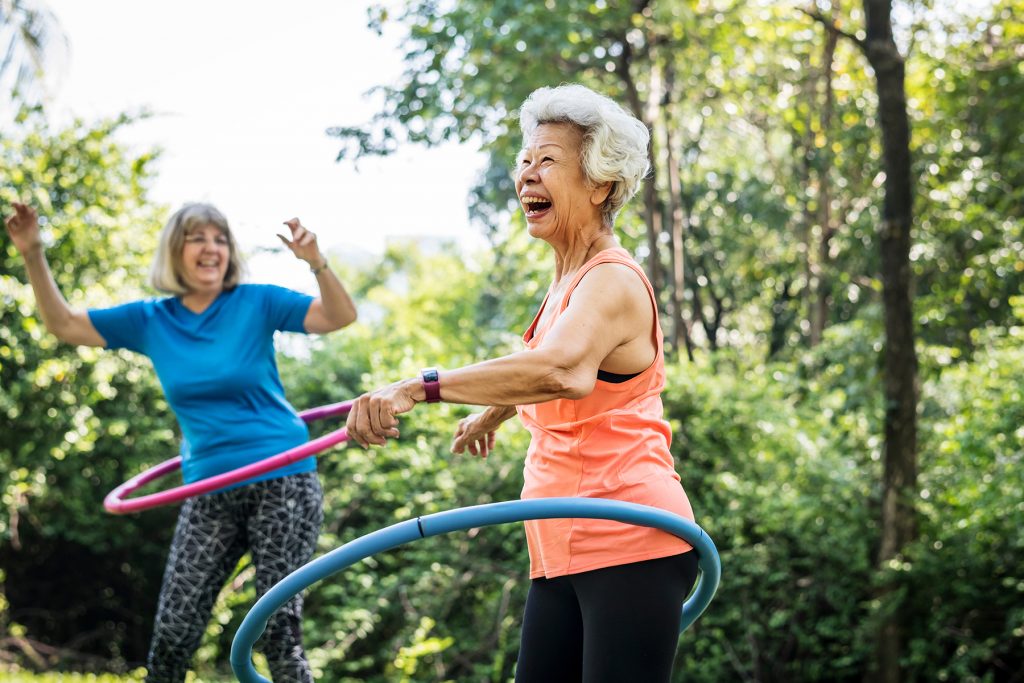
The later decades of your life can be among the most rewarding. You have more free time to devote to hobbies and people that make you happiest. You may be blessed with the joys of becoming a grandparent. You have more wisdom, patience, and confidence than you did when you were younger. And you have the perspective to know not to take any of it for granted.
It’s important to keep your body and mind healthy to enjoy these years to their fullest. The key to healthy aging is maintaining a healthy lifestyle. There are five essential science-backed elements to living a healthy lifestyle at any that any age, which continue to serve as a strong foundation for health and daily well-being as we age.
The 5 essential elements of healthy aging are:
- Diet
Many Americans consume far more sodium, sugar, and fat than they should, but following a healthy diet can become even more challenging as we age. Make sure your diet is largely composed of whole foods, including vegetables, fruits, whole grains, and good sources of protein. If cooking for yourself becomes an obstacle, take advantage of your senior living community’s dining room. The menus are created according to nutritional guidelines and will help you maintain a balanced diet.
- Exercise
Regular exercise is one of the most important elements of physical and mental well-being at any age. And contrary to popular assumption, it only becomes more important as we get older. Maintaining your physical fitness will help you retain independence, prevent injury, and can provide relief from chronic illnesses such as arthritis and diabetes.If you don’t already have a fitness regimen, read our tips for how to start an exercise routine after age 60.
- Relationships
Loneliness is among the biggest dangers to your health — especially later in life. Social isolation increases risk for depression, anxiety, dementia, and even early mortality. Maintaining an active social life can certainly become more challenging as we age, but that just means it’s even more important to make this area of your life a priority. Set up weekly calls or visits with family members, go on walks or get meals with friends, and find ways to get involved in your community.
- Mental Stimulation
Some people assume that cognitive decline is a natural byproduct of aging, but that doesn’t have to be the case. Practicing good habits for your cognitive health can prevent Alzheimer’s and dementia, improve memory, and minimize those pesky “senior moments.” The good news is that following the other four essential habits of healthy aging will naturally support brain health. In addition, find ways to keep your brain active every day. Try new things, learn a new skill, read books, play games, and engage in meaningful activities like volunteering.
- Sleep
Yes, sleep is an essential part of a healthy lifestyle! Sleep is restorative; while you’re catching Z’s, your body repairs any cellular damage that occurred during the day and reboots your immune system. A good night’s sleep also supports memory, mood, and concentration. Older adults who don’t get enough sleep are more susceptible to depression, memory loss, nighttime falls, and infection.Insomnia becomes more common as we age. To make sure you’re getting good quality sleep, build a healthy sleep routine and stick to it. Go to bed at the same time every day, keep your bedroom as dark as possible, and avoid caffeine and alcohol in the evening.
If you’re struggling with any of these five elements of healthy aging, ask for help. Talk to your doctor about any concerns you have about your health, reach out to the staff in your community, or confide in a trusted friend or family member. The most important thing to remember about aging is that none of us should do it alone. Take advantage of the support systems around you and ask for help when you need it.
Comments are closed.